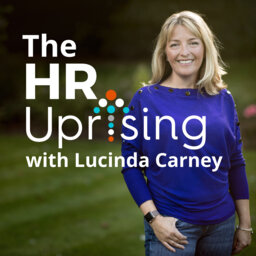Rewards and Recognition Masterclass with Tom Robinson
In this episode of the HR Uprising Podcast, joining Lucinda is Tom Robinson, conducting our second Masterclass episode focusing on Rewards and Recognition programmes.
In addition, Tom Robinson is an Organisational Development expert, and a self-professed “people geek”, who is currently the boss at Talent Tomorrow, a company offering a bespoke diagnosis for businesses looking to heal and improve their behavioural and cultural issues.
Certainly, Tom is no stranger to The HR Uprising Podcast; in fact, he was one of Lucinda’s top picks for 2019’s 12-In-12 HR Professionals Feature.
Tom has kindly agreed to participate in this masterclass with Lucinda, so as to better demonstrate what really works in terms of rewards, and which incentives can really help to move the dial in terms of people.
Valuable Resources
- Host of The HR Uprising Podcast, Lucinda Carney, is also the founder and CEO of Actus Software, where you can find additional free HR Resources: https://actus.co.uk/free-performance-management-resources/
- Join the HR Uprising LinkedIn Group
- Talent Tomorrow
KEY TAKEAWAYS
What are some examples of rewards and recognition?
- Rewards tend to refer to the “tangible stuff”. Things such as pay benefits, tickets, vouchers, extra holiday allowances, and even supplemental educational programmes.
- Recognition tends to involve the more intangible things, such as personal thank-yous, increase in status and extra encouragement. Things that don’t cost money, but which can give just as much of a boost.
- Certainly, the categories of rewards from which people benefit the most are:
- The feeling of making a difference
- Recognition - the feeling of being worthwhile
- Enjoyment
- Respect and trust from your manager
- Pay
- Logistics
- Benefits and perks
- Working conditions
What does current research say?
- A survey of two thousand people found that the biggest motivational factor amongst people at work is being appreciated, as well as being made to feel worthwhile. More tangible, temporary rewards such as pay, come far down the scale as their effects are brief and transient.
- The balance of power seems to have shifted somewhat in recent years, leading to a more employee, or candidate-led market when it comes to the workplace. Perks that were seen as revolutionary some years ago are now merely expected, especially in the world of startups.
What should we keep in mind?
- Motivations change almost as soon as employment contracts are signed. What attracts people to positions doesn’t necessarily motivate them to keep growing and developing each day.
- Techniques such as league tables, leaderboards, or any other “motivators” that set teams against each other, can have a drastically negative impact on morale and culture.
What should we be doing to successfully use rewards and recognition programmes?
- We should not focus purely on the things people do wrong, but actively seek out the things that people are doing right.
- Certainly, rewards need to be scaleable. What works to motivate a small team of twenty might be completely unrealistic to an organisation of ten thousand.
- Rather than going for a blanket approach, make sure that managers have decision-making power over the things they’re rewarding people on. They need the autonomy to be able to make rewards and recognition more bespoke, and more personal.
BEST MOMENTS
- 'The stuff that’s visible is the tangible stuff'
- 'The things you spend money on aren’t necessarily as important'
- 'People are more likely to feel valued if they are made to valued at work'
- 'The keyword is “everyday”'
- 'What behaviours are you encouraging in people?'
- 'Context is crucial'
- 'Make things meaningful'
ABOUT THE GUEST
Tom Robinson is the multi-award-winning Managing Director of Talent Tomorrow, a small Organisational Development consultancy.
Overall, Tom has spent 20 years in senior roles in the behavioural side of Learning and Talent Development. He currently specialises in organisational behaviour, people development as well as culture change.
In addition, Tom lives in Hertfordshire with his wife and two children and is a keen triathlete.
Key Information:
- Connect with Tom on LinkedIn
- Tom on Twitter: @Talent_Tom
- Talent Tomorrow Website
ABOUT THE HOST
Lucinda Carney is a Business Psychologist with 15 years in Senior Corporate L&D roles and a further 10 as CEO of Actus Software where she worked closely with HR colleagues helping them to solve the same challenges across a huge range of industries. It was this breadth of experience that inspired Lucinda to set up the HR Uprising community to facilitate greater collaboration across HR professionals in different sectors, helping them to ‘rise up’ together.
“If you look up, you rise up”
CONTACT METHOD
- Join the LinkedIn community - https://www.linkedin.com/groups/13714397/
- Email: Lucinda@advancechange.co.uk
- Linked In: https://www.linkedin.com/in/lucindacarney/
- Twitter: @lucindacarney
- Instagram: @hruprising
- Facebook: @hruprising
 The HR Uprising
The HR Uprising


